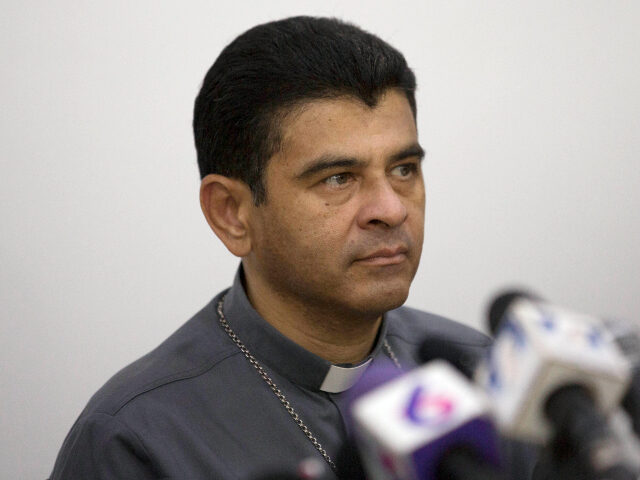The Sandinista regime of Nicaragua announced on Sunday that it had struck a deal with the Vatican to expel 19 Catholic clergymen imprisoned for their faith, including Monsignor Rolando Álvarez, a firm regime critic sentenced to 26 years in prison for opposing communism.
The regime of dictator Daniel Ortega “profoundly thanked” Pope Francis and the Holy See for “the very respectful and discreet coordination realized to make possible the travel to the Vatican of the two bishops, 15 priests, and two seminarians.” The clergymen reportedly traveled out of Nicaragua to Venezuela, a fellow socialist country, before arriving in Rome. One of the 19 is believed to have remained in Venezuela.
“We recognize the possibilities of frank, direct, prudent, and very serious dialogue,” the official Ortega regime statement read, “a responsible and careful dialogue, which has made possible for this day of worship to the God of all to arrive.”
Images surfaced from the Vatican on Monday of Álvarez and the other exiled bishop, Monsignor Isidro del Carmen Mora Ortega, presiding over a Mass in Rome and meeting with senior Vatican officials.
A photo from their meeting with Cardinal Parolin and first Holy Eucharist after imprisonment. It is confirmed, Bishop Rolando Alvarez of the Diocese of Matagalpa in Nicaragua is finally free and in Rome tonight. https://t.co/J7VDj8sxTr pic.twitter.com/V4XNywlNA1
— Fr. Manuel Dorantes (@TweetingPriest) January 15, 2024
The release appears to be part of an ongoing campaign to erase Catholicism, and Christianity generally, in Nicaragua. An estimated 50 percent of Nicaraguans are Catholics and over 83 percent identify as either Catholic or Evangelical. Despite the pervasive influence of Christianity in the daily life of Nicaraguans, the Ortega regime launched a campaign of persecution against the Catholic Church during the wave of anti-communist protests of 2018, in which Church leaders supported calls for a restoration of democracy and lent aid and shelter to persecuted dissidents. The Sandinistas killed over 300 people in that wave of unrest and reportedly tortured untold numbers, including some American citizens.
Ortega formally announced a “war” on Catholicism in 2022 because, through the free expression of dissent from Marxist thought, the Vatican was allegedly attempting a “coup” in his country. Ortega referred to Catholics, the largest religious group in the country, as “terrorists.”
“A coup d’état, an institution like the Catholic Church, using its bishops here in Nicaragua to carry out a coup d’état. Since when are priests ready to stage a coup? And since when do they have the authority to speak of democracy?” Ortega said at the time. “Who elects the priests, the bishops, the pope, the cardinals? How many votes? Who gives them to them?”
That “war” has consisted of violent state assaults on churches and the imprisonment and abuse of priests and lay believers by the state. In December, the regime expanded its persecution to include Evangelicals, arresting 11 leaders associated with the U.S.-based Mountain Gateway Ministry, which had previously claimed to stage events attracting hundreds of thousands of people to worship Jesus.
An estimated 100 political prisoners remain behind bars in Nicaragua as a result of their opposition to Marxism.
Álvarez, who marked 500 days in prison in the first week of 2024, became the face of that persecution after rejecting exile, insisting on staying in Nicaragua and serving the faithful in his homeland. The bishop of Matagalpa, Álvarez was the only one of a group of 223 dissidents the regime attempted to exile in February 2023 to refuse to abandon his country.
Catholic news organization The Pillar wrote that Álvarez refused to leave the country because “the conditions of his potential release were never adequately explained to him and he was asked to sign a blank sheet of paper which could be used as a confession.”
In response to his refusal to leave, Ortega sentenced Álvarez to 26 years in prison on a variety of spurious “fake news” and “coup” charges.
As part of his punishment for insisting on staying in Nicaragua, Ortega stripped Álvarez of his Nicaraguan citizenship, rendering him a stateless person in violation of international law. Neither the Vatican nor the Nicaraguan government explained how Álvarez achieved international travel without a passport or affiliation with any state. Vatican News described all the Catholic leaders as “guests of the Holy See” for the time being, but it remains unknown at press time how many, if any of them, will remain there permanently. It is also unclear how Álvarez could travel to a third country without a nationality.
Álvarez was reportedly one of two imprisoned Nicaraguan bishops released this weekend and flown to Vatican City. The other –Monsignor Isidro del Carmen Mora Ortega, the bishop of Siuna, was arrested on December 20 after leading a Mass to mark the 99th anniversary of the Diocese of Matagalpa. At that event, Mora declared that Nicaragua’s Catholic population was “united praying for this beloved Diocese of Matagalpa, praying for Monsignor Rolando, praying for the paths of every one of you.”
Mora cited a parable by Jesus in which he said a good shepherd would leave 99 safe sheep to find one that goes missing.
“We live in times, brothers, where we have to leave one to save the other 99,” he lamented, an apparent criticism of the regime that landed him in prison.
Ortega has exiled about 110 priests since 2018. Álvarez’s home diocese of Matagalpa has lost 20 of its 51 priests since 2019.

COMMENTS
Please let us know if you're having issues with commenting.